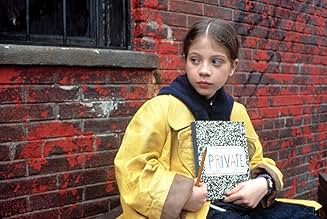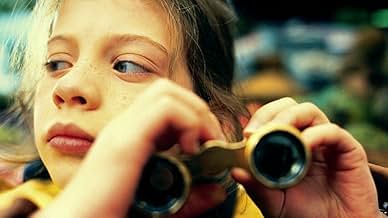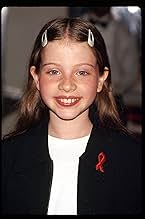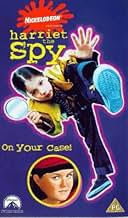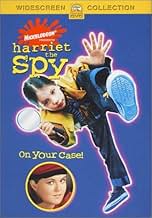Harriet M. Welsch is a spy. But when her friends find her secret notebook, the tables are turned on her. Can she win them back and still keep on going with the spy business?Harriet M. Welsch is a spy. But when her friends find her secret notebook, the tables are turned on her. Can she win them back and still keep on going with the spy business?Harriet M. Welsch is a spy. But when her friends find her secret notebook, the tables are turned on her. Can she win them back and still keep on going with the spy business?
- Awards
- 3 wins & 2 nominations total
Vanessa Chester
- Janie Gibbs
- (as Vanessa Lee Chester)
Featured review
This little film has been roundly criticized for being disjointed and amateurish.
Well, it _is_ disjointed: part of it is surreal allegory, part realistic morality play. Part of it moves with a natural rhythm while other parts seem to have been transplanted from afternoon TeeVee. Some is done with a cartoon cosmology, and the rest is straight from Marlo Thomas' heart. Distributed throughout are mottles of bad acting and unconsidered dialog.
And I loved it all. Why?
Because this is in the tradition of movies and books that generate themselves. Rather, the characters in the stories play double duty as the authors of the story and the creators of the world that surrounds it. So it makes sense as precisely what a preteen would imagine her older self writing about her.
Indeed, the whole thing is a meditation on how someone might abstract the world (for writing) without a mature faculty for abstraction which is to say how a kid would imagine an adult's mind imagining a kid's mind.
Its all about the deep problems of writing. I imagine the author of the original book sitting down and having trouble writing, them ruminating about why on the page.
Therefore, we have a youthful experimenter, a blocked writer, a "gardener" who makes environments from trash, another maker of environments (cages) who craves companionship, a woman who lives in a cage (Kitt), the Dad who is a movie comedian, together with lesser characters.
And the spy who spies so she can write what we see. It is all about sight and callow abstraction, just what movies were made for. Sure, it differs from the book because film can amplify what the book cannot. The adapter (the guy that did the game as life as game "Jumanji" project) understood this.
Ted's Evaluation -- 3 of 3: Worth watching.
Well, it _is_ disjointed: part of it is surreal allegory, part realistic morality play. Part of it moves with a natural rhythm while other parts seem to have been transplanted from afternoon TeeVee. Some is done with a cartoon cosmology, and the rest is straight from Marlo Thomas' heart. Distributed throughout are mottles of bad acting and unconsidered dialog.
And I loved it all. Why?
Because this is in the tradition of movies and books that generate themselves. Rather, the characters in the stories play double duty as the authors of the story and the creators of the world that surrounds it. So it makes sense as precisely what a preteen would imagine her older self writing about her.
Indeed, the whole thing is a meditation on how someone might abstract the world (for writing) without a mature faculty for abstraction which is to say how a kid would imagine an adult's mind imagining a kid's mind.
Its all about the deep problems of writing. I imagine the author of the original book sitting down and having trouble writing, them ruminating about why on the page.
Therefore, we have a youthful experimenter, a blocked writer, a "gardener" who makes environments from trash, another maker of environments (cages) who craves companionship, a woman who lives in a cage (Kitt), the Dad who is a movie comedian, together with lesser characters.
And the spy who spies so she can write what we see. It is all about sight and callow abstraction, just what movies were made for. Sure, it differs from the book because film can amplify what the book cannot. The adapter (the guy that did the game as life as game "Jumanji" project) understood this.
Ted's Evaluation -- 3 of 3: Worth watching.
Storyline
Did you know
- TriviaNickelodeon's first feature film.
- GoofsWhen Harriet's parents confront her about her retaliation against the other students who have bullied her, Mrs. Welsch claims that Laura Peters' parents have called to inform her and Mr. Welsch that Laura has locked herself in the bathroom and won't come out (after having had her long braid cut off by Harriet). However, in a scene taking place between Laura's "haircut" and the angry phone calls, a short-haired Laura is seen with the other girls throwing spitballs on the ceiling of the school restroom and laughing, not seeming even the least bit upset about having all of her hair hacked off.
- Crazy creditsDuring the opening credits, items from Harriet's spy kit (i.e. magnifying glass, flashlight, and compass) are seen interacting with the credits as they appear.
- SoundtracksWack Wack
Written by Eldee Young, Hysear Walker, Isaac Holt & Donald Storball (as Don Storball)
Performed by The Young Holt Trio (as Young-Holt Unlimited)
Courtesy of Brunswick Record Corp.
- How long is Harriet the Spy?Powered by Alexa
Details
Box office
- Budget
- $12,000,000 (estimated)
- Gross US & Canada
- $26,570,048
- Opening weekend US & Canada
- $6,601,651
- Jul 14, 1996
- Gross worldwide
- $26,570,048
- Runtime1 hour 40 minutes
- Color
- Sound mix
- Aspect ratio
- 1.85 : 1
Contribute to this page
Suggest an edit or add missing content
















